Legal System for Business: Classifications of Law, Source of Law, UK Law Making Process, Employment Law
VerifiedAdded on 2023/06/17
|8
|2645
|72
AI Summary
This report covers the laws and regulations implemented in the UK nation. It describes the courts, case laws, and the making process of the legislation. It further describes the employee laws which are mandatory to implement in the organization, and the duties of the employer towards the employee or the wrong dismissal of the employee.
Contribute Materials
Your contribution can guide someone’s learning journey. Share your
documents today.
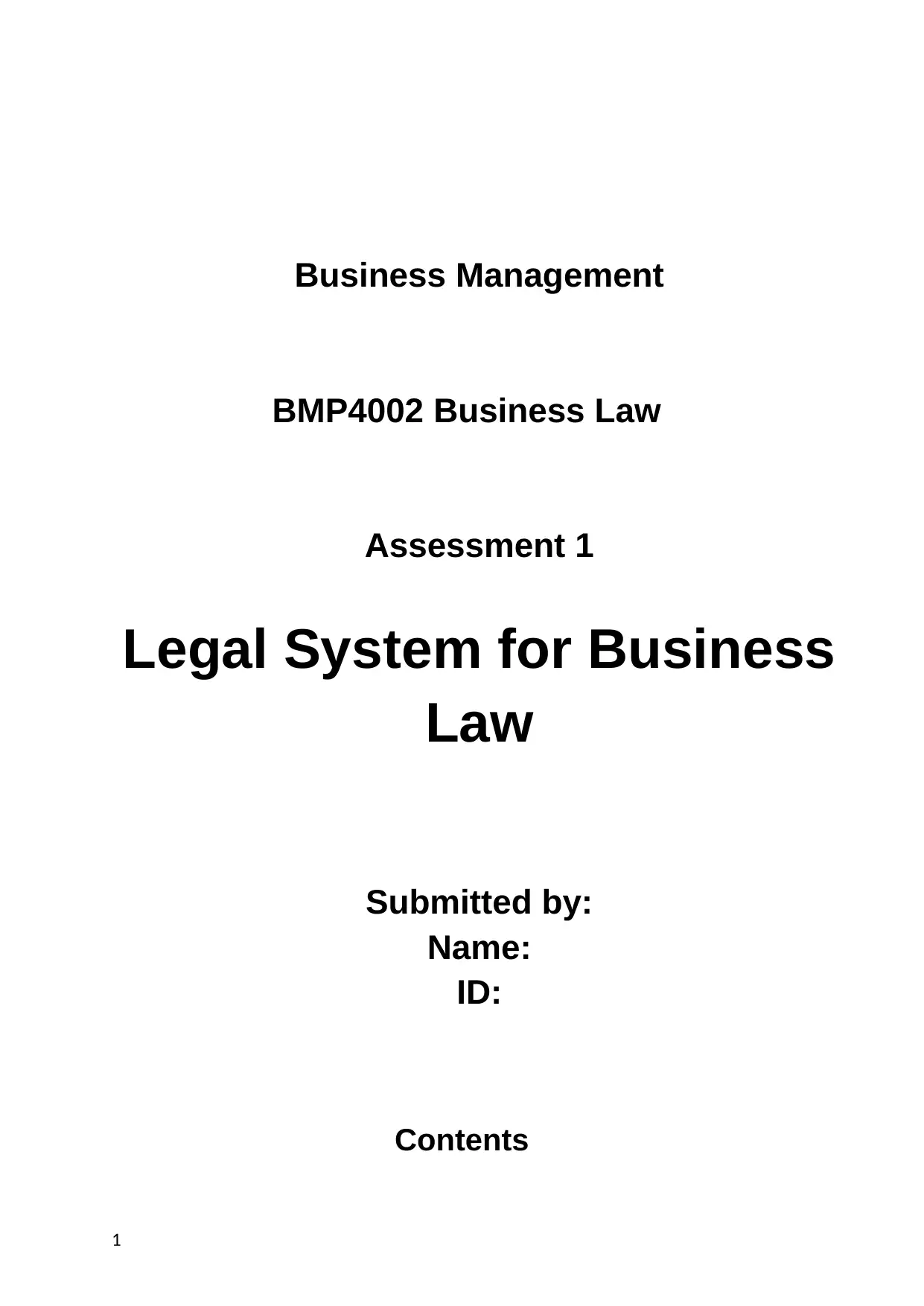
Business Management
BMP4002 Business Law
Assessment 1
Legal System for Business
Law
Submitted by:
Name:
ID:
Contents
1
BMP4002 Business Law
Assessment 1
Legal System for Business
Law
Submitted by:
Name:
ID:
Contents
1
Secure Best Marks with AI Grader
Need help grading? Try our AI Grader for instant feedback on your assignments.
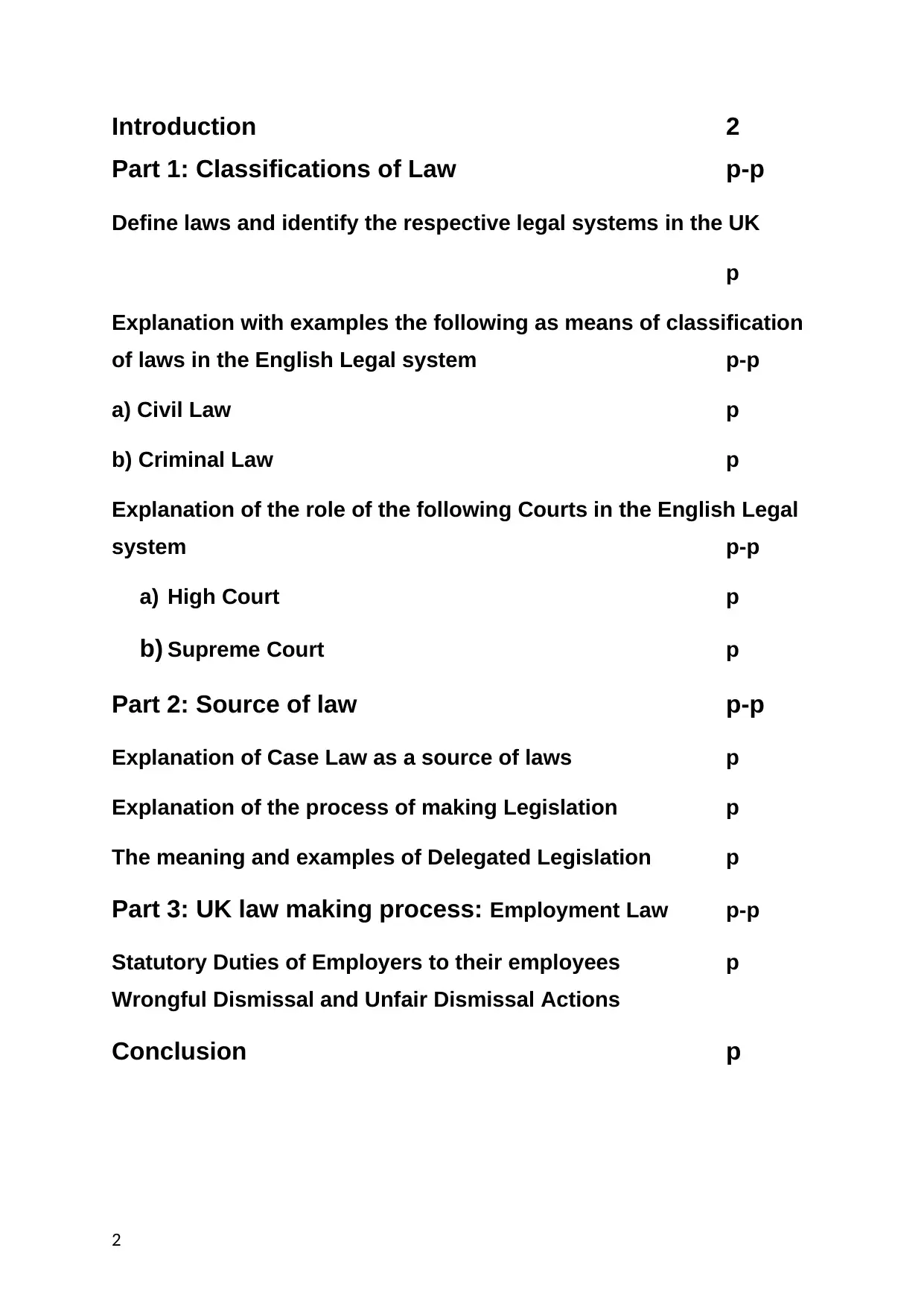
Introduction 2
Part 1: Classifications of Law p-p
Define laws and identify the respective legal systems in the UK
p
Explanation with examples the following as means of classification
of laws in the English Legal system p-p
a) Civil Law p
b) Criminal Law p
Explanation of the role of the following Courts in the English Legal
system p-p
a) High Court p
b) Supreme Court p
Part 2: Source of law p-p
Explanation of Case Law as a source of laws p
Explanation of the process of making Legislation p
The meaning and examples of Delegated Legislation p
Part 3: UK law making process: Employment Law p-p
Statutory Duties of Employers to their employees p
Wrongful Dismissal and Unfair Dismissal Actions
Conclusion p
2
Part 1: Classifications of Law p-p
Define laws and identify the respective legal systems in the UK
p
Explanation with examples the following as means of classification
of laws in the English Legal system p-p
a) Civil Law p
b) Criminal Law p
Explanation of the role of the following Courts in the English Legal
system p-p
a) High Court p
b) Supreme Court p
Part 2: Source of law p-p
Explanation of Case Law as a source of laws p
Explanation of the process of making Legislation p
The meaning and examples of Delegated Legislation p
Part 3: UK law making process: Employment Law p-p
Statutory Duties of Employers to their employees p
Wrongful Dismissal and Unfair Dismissal Actions
Conclusion p
2
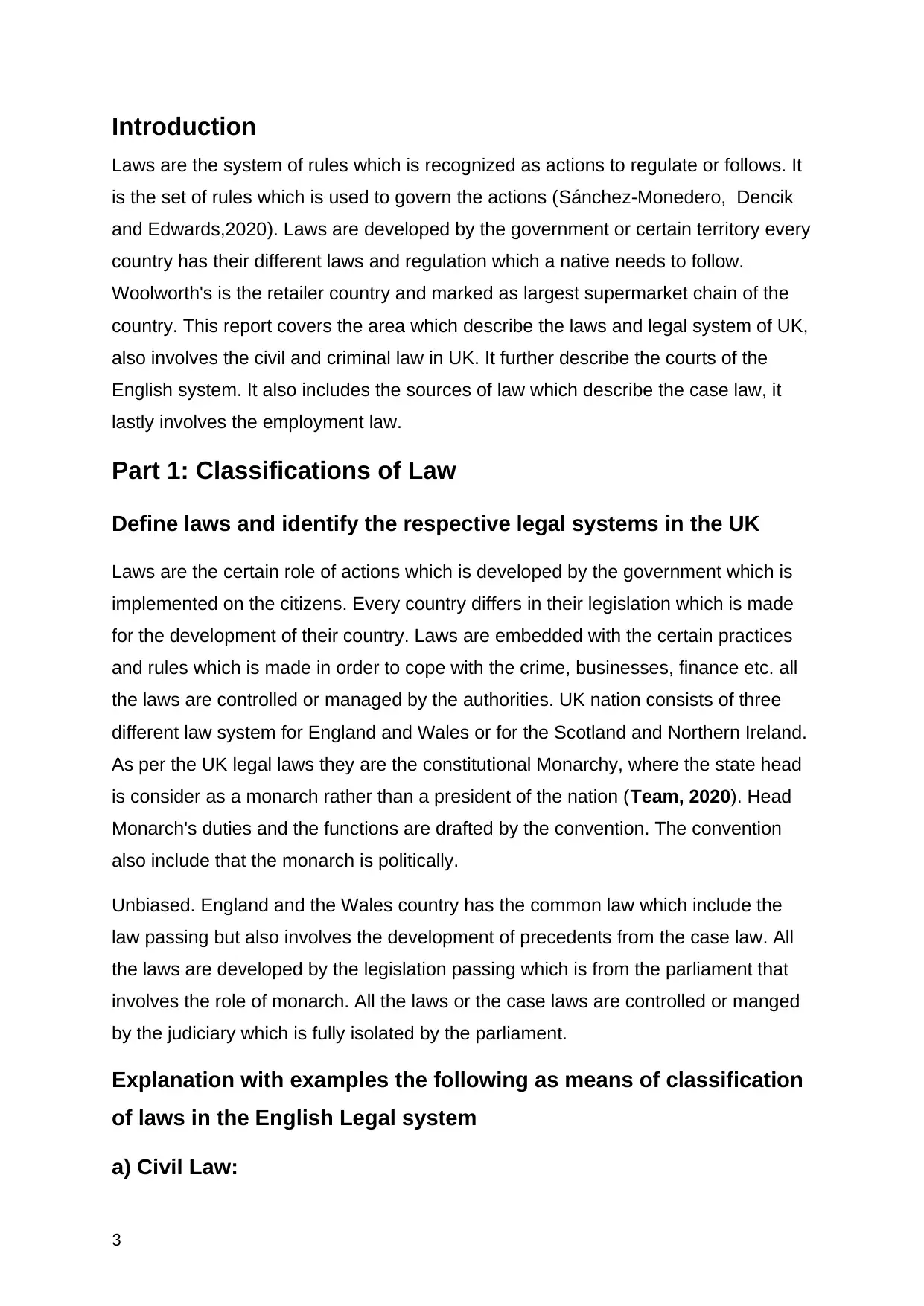
Introduction
Laws are the system of rules which is recognized as actions to regulate or follows. It
is the set of rules which is used to govern the actions (Sánchez-Monedero, Dencik
and Edwards,2020). Laws are developed by the government or certain territory every
country has their different laws and regulation which a native needs to follow.
Woolworth's is the retailer country and marked as largest supermarket chain of the
country. This report covers the area which describe the laws and legal system of UK,
also involves the civil and criminal law in UK. It further describe the courts of the
English system. It also includes the sources of law which describe the case law, it
lastly involves the employment law.
Part 1: Classifications of Law
Define laws and identify the respective legal systems in the UK
Laws are the certain role of actions which is developed by the government which is
implemented on the citizens. Every country differs in their legislation which is made
for the development of their country. Laws are embedded with the certain practices
and rules which is made in order to cope with the crime, businesses, finance etc. all
the laws are controlled or managed by the authorities. UK nation consists of three
different law system for England and Wales or for the Scotland and Northern Ireland.
As per the UK legal laws they are the constitutional Monarchy, where the state head
is consider as a monarch rather than a president of the nation (Team, 2020). Head
Monarch's duties and the functions are drafted by the convention. The convention
also include that the monarch is politically.
Unbiased. England and the Wales country has the common law which include the
law passing but also involves the development of precedents from the case law. All
the laws are developed by the legislation passing which is from the parliament that
involves the role of monarch. All the laws or the case laws are controlled or manged
by the judiciary which is fully isolated by the parliament.
Explanation with examples the following as means of classification
of laws in the English Legal system
a) Civil Law:
3
Laws are the system of rules which is recognized as actions to regulate or follows. It
is the set of rules which is used to govern the actions (Sánchez-Monedero, Dencik
and Edwards,2020). Laws are developed by the government or certain territory every
country has their different laws and regulation which a native needs to follow.
Woolworth's is the retailer country and marked as largest supermarket chain of the
country. This report covers the area which describe the laws and legal system of UK,
also involves the civil and criminal law in UK. It further describe the courts of the
English system. It also includes the sources of law which describe the case law, it
lastly involves the employment law.
Part 1: Classifications of Law
Define laws and identify the respective legal systems in the UK
Laws are the certain role of actions which is developed by the government which is
implemented on the citizens. Every country differs in their legislation which is made
for the development of their country. Laws are embedded with the certain practices
and rules which is made in order to cope with the crime, businesses, finance etc. all
the laws are controlled or managed by the authorities. UK nation consists of three
different law system for England and Wales or for the Scotland and Northern Ireland.
As per the UK legal laws they are the constitutional Monarchy, where the state head
is consider as a monarch rather than a president of the nation (Team, 2020). Head
Monarch's duties and the functions are drafted by the convention. The convention
also include that the monarch is politically.
Unbiased. England and the Wales country has the common law which include the
law passing but also involves the development of precedents from the case law. All
the laws are developed by the legislation passing which is from the parliament that
involves the role of monarch. All the laws or the case laws are controlled or manged
by the judiciary which is fully isolated by the parliament.
Explanation with examples the following as means of classification
of laws in the English Legal system
a) Civil Law:
3
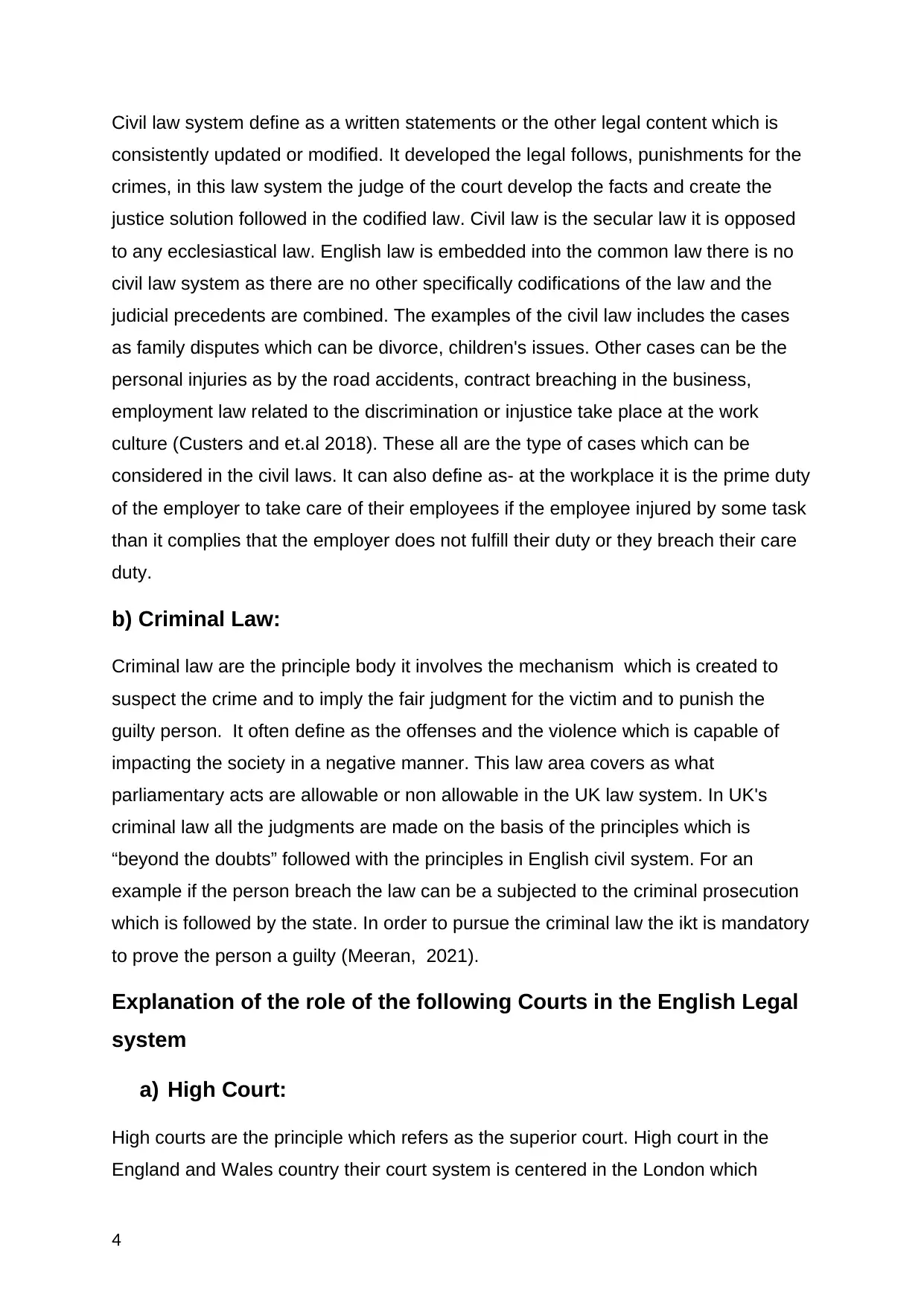
Civil law system define as a written statements or the other legal content which is
consistently updated or modified. It developed the legal follows, punishments for the
crimes, in this law system the judge of the court develop the facts and create the
justice solution followed in the codified law. Civil law is the secular law it is opposed
to any ecclesiastical law. English law is embedded into the common law there is no
civil law system as there are no other specifically codifications of the law and the
judicial precedents are combined. The examples of the civil law includes the cases
as family disputes which can be divorce, children's issues. Other cases can be the
personal injuries as by the road accidents, contract breaching in the business,
employment law related to the discrimination or injustice take place at the work
culture (Custers and et.al 2018). These all are the type of cases which can be
considered in the civil laws. It can also define as- at the workplace it is the prime duty
of the employer to take care of their employees if the employee injured by some task
than it complies that the employer does not fulfill their duty or they breach their care
duty.
b) Criminal Law:
Criminal law are the principle body it involves the mechanism which is created to
suspect the crime and to imply the fair judgment for the victim and to punish the
guilty person. It often define as the offenses and the violence which is capable of
impacting the society in a negative manner. This law area covers as what
parliamentary acts are allowable or non allowable in the UK law system. In UK's
criminal law all the judgments are made on the basis of the principles which is
“beyond the doubts” followed with the principles in English civil system. For an
example if the person breach the law can be a subjected to the criminal prosecution
which is followed by the state. In order to pursue the criminal law the ikt is mandatory
to prove the person a guilty (Meeran, 2021).
Explanation of the role of the following Courts in the English Legal
system
a) High Court:
High courts are the principle which refers as the superior court. High court in the
England and Wales country their court system is centered in the London which
4
consistently updated or modified. It developed the legal follows, punishments for the
crimes, in this law system the judge of the court develop the facts and create the
justice solution followed in the codified law. Civil law is the secular law it is opposed
to any ecclesiastical law. English law is embedded into the common law there is no
civil law system as there are no other specifically codifications of the law and the
judicial precedents are combined. The examples of the civil law includes the cases
as family disputes which can be divorce, children's issues. Other cases can be the
personal injuries as by the road accidents, contract breaching in the business,
employment law related to the discrimination or injustice take place at the work
culture (Custers and et.al 2018). These all are the type of cases which can be
considered in the civil laws. It can also define as- at the workplace it is the prime duty
of the employer to take care of their employees if the employee injured by some task
than it complies that the employer does not fulfill their duty or they breach their care
duty.
b) Criminal Law:
Criminal law are the principle body it involves the mechanism which is created to
suspect the crime and to imply the fair judgment for the victim and to punish the
guilty person. It often define as the offenses and the violence which is capable of
impacting the society in a negative manner. This law area covers as what
parliamentary acts are allowable or non allowable in the UK law system. In UK's
criminal law all the judgments are made on the basis of the principles which is
“beyond the doubts” followed with the principles in English civil system. For an
example if the person breach the law can be a subjected to the criminal prosecution
which is followed by the state. In order to pursue the criminal law the ikt is mandatory
to prove the person a guilty (Meeran, 2021).
Explanation of the role of the following Courts in the English Legal
system
a) High Court:
High courts are the principle which refers as the superior court. High court in the
England and Wales country their court system is centered in the London which
4
Secure Best Marks with AI Grader
Need help grading? Try our AI Grader for instant feedback on your assignments.
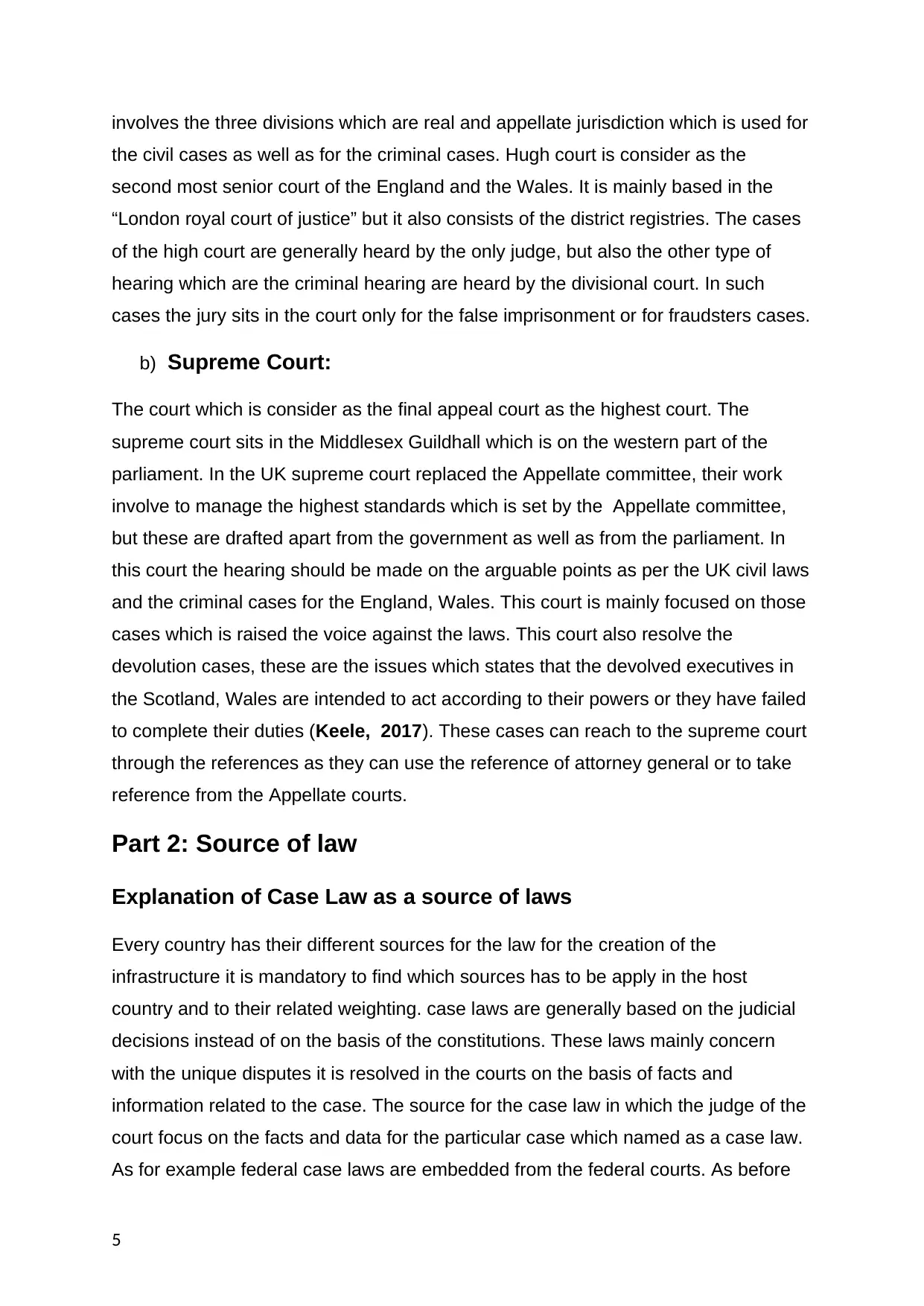
involves the three divisions which are real and appellate jurisdiction which is used for
the civil cases as well as for the criminal cases. Hugh court is consider as the
second most senior court of the England and the Wales. It is mainly based in the
“London royal court of justice” but it also consists of the district registries. The cases
of the high court are generally heard by the only judge, but also the other type of
hearing which are the criminal hearing are heard by the divisional court. In such
cases the jury sits in the court only for the false imprisonment or for fraudsters cases.
b) Supreme Court:
The court which is consider as the final appeal court as the highest court. The
supreme court sits in the Middlesex Guildhall which is on the western part of the
parliament. In the UK supreme court replaced the Appellate committee, their work
involve to manage the highest standards which is set by the Appellate committee,
but these are drafted apart from the government as well as from the parliament. In
this court the hearing should be made on the arguable points as per the UK civil laws
and the criminal cases for the England, Wales. This court is mainly focused on those
cases which is raised the voice against the laws. This court also resolve the
devolution cases, these are the issues which states that the devolved executives in
the Scotland, Wales are intended to act according to their powers or they have failed
to complete their duties (Keele, 2017). These cases can reach to the supreme court
through the references as they can use the reference of attorney general or to take
reference from the Appellate courts.
Part 2: Source of law
Explanation of Case Law as a source of laws
Every country has their different sources for the law for the creation of the
infrastructure it is mandatory to find which sources has to be apply in the host
country and to their related weighting. case laws are generally based on the judicial
decisions instead of on the basis of the constitutions. These laws mainly concern
with the unique disputes it is resolved in the courts on the basis of facts and
information related to the case. The source for the case law in which the judge of the
court focus on the facts and data for the particular case which named as a case law.
As for example federal case laws are embedded from the federal courts. As before
5
the civil cases as well as for the criminal cases. Hugh court is consider as the
second most senior court of the England and the Wales. It is mainly based in the
“London royal court of justice” but it also consists of the district registries. The cases
of the high court are generally heard by the only judge, but also the other type of
hearing which are the criminal hearing are heard by the divisional court. In such
cases the jury sits in the court only for the false imprisonment or for fraudsters cases.
b) Supreme Court:
The court which is consider as the final appeal court as the highest court. The
supreme court sits in the Middlesex Guildhall which is on the western part of the
parliament. In the UK supreme court replaced the Appellate committee, their work
involve to manage the highest standards which is set by the Appellate committee,
but these are drafted apart from the government as well as from the parliament. In
this court the hearing should be made on the arguable points as per the UK civil laws
and the criminal cases for the England, Wales. This court is mainly focused on those
cases which is raised the voice against the laws. This court also resolve the
devolution cases, these are the issues which states that the devolved executives in
the Scotland, Wales are intended to act according to their powers or they have failed
to complete their duties (Keele, 2017). These cases can reach to the supreme court
through the references as they can use the reference of attorney general or to take
reference from the Appellate courts.
Part 2: Source of law
Explanation of Case Law as a source of laws
Every country has their different sources for the law for the creation of the
infrastructure it is mandatory to find which sources has to be apply in the host
country and to their related weighting. case laws are generally based on the judicial
decisions instead of on the basis of the constitutions. These laws mainly concern
with the unique disputes it is resolved in the courts on the basis of facts and
information related to the case. The source for the case law in which the judge of the
court focus on the facts and data for the particular case which named as a case law.
As for example federal case laws are embedded from the federal courts. As before
5
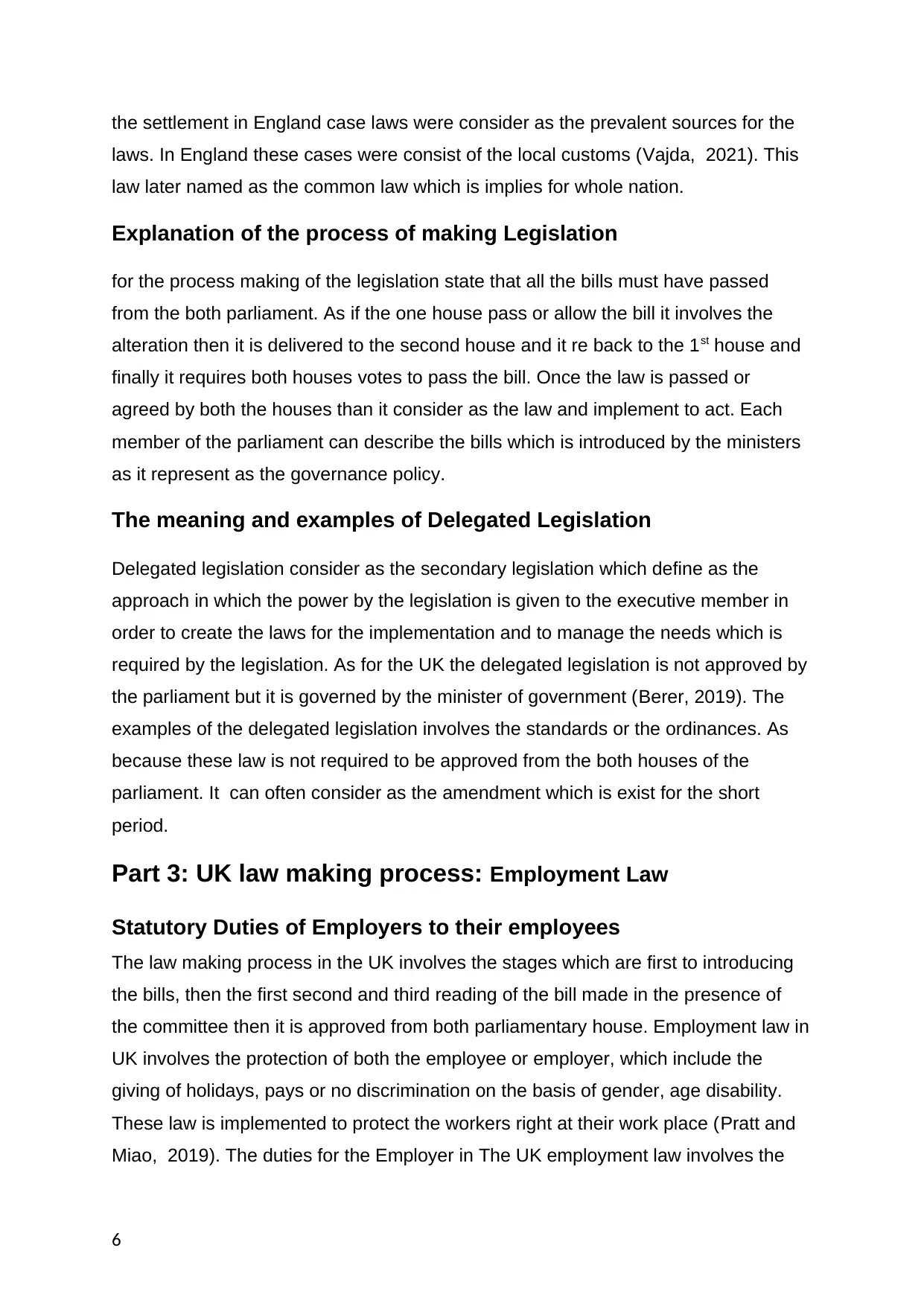
the settlement in England case laws were consider as the prevalent sources for the
laws. In England these cases were consist of the local customs (Vajda, 2021). This
law later named as the common law which is implies for whole nation.
Explanation of the process of making Legislation
for the process making of the legislation state that all the bills must have passed
from the both parliament. As if the one house pass or allow the bill it involves the
alteration then it is delivered to the second house and it re back to the 1st house and
finally it requires both houses votes to pass the bill. Once the law is passed or
agreed by both the houses than it consider as the law and implement to act. Each
member of the parliament can describe the bills which is introduced by the ministers
as it represent as the governance policy.
The meaning and examples of Delegated Legislation
Delegated legislation consider as the secondary legislation which define as the
approach in which the power by the legislation is given to the executive member in
order to create the laws for the implementation and to manage the needs which is
required by the legislation. As for the UK the delegated legislation is not approved by
the parliament but it is governed by the minister of government (Berer, 2019). The
examples of the delegated legislation involves the standards or the ordinances. As
because these law is not required to be approved from the both houses of the
parliament. It can often consider as the amendment which is exist for the short
period.
Part 3: UK law making process: Employment Law
Statutory Duties of Employers to their employees
The law making process in the UK involves the stages which are first to introducing
the bills, then the first second and third reading of the bill made in the presence of
the committee then it is approved from both parliamentary house. Employment law in
UK involves the protection of both the employee or employer, which include the
giving of holidays, pays or no discrimination on the basis of gender, age disability.
These law is implemented to protect the workers right at their work place (Pratt and
Miao, 2019). The duties for the Employer in The UK employment law involves the
6
laws. In England these cases were consist of the local customs (Vajda, 2021). This
law later named as the common law which is implies for whole nation.
Explanation of the process of making Legislation
for the process making of the legislation state that all the bills must have passed
from the both parliament. As if the one house pass or allow the bill it involves the
alteration then it is delivered to the second house and it re back to the 1st house and
finally it requires both houses votes to pass the bill. Once the law is passed or
agreed by both the houses than it consider as the law and implement to act. Each
member of the parliament can describe the bills which is introduced by the ministers
as it represent as the governance policy.
The meaning and examples of Delegated Legislation
Delegated legislation consider as the secondary legislation which define as the
approach in which the power by the legislation is given to the executive member in
order to create the laws for the implementation and to manage the needs which is
required by the legislation. As for the UK the delegated legislation is not approved by
the parliament but it is governed by the minister of government (Berer, 2019). The
examples of the delegated legislation involves the standards or the ordinances. As
because these law is not required to be approved from the both houses of the
parliament. It can often consider as the amendment which is exist for the short
period.
Part 3: UK law making process: Employment Law
Statutory Duties of Employers to their employees
The law making process in the UK involves the stages which are first to introducing
the bills, then the first second and third reading of the bill made in the presence of
the committee then it is approved from both parliamentary house. Employment law in
UK involves the protection of both the employee or employer, which include the
giving of holidays, pays or no discrimination on the basis of gender, age disability.
These law is implemented to protect the workers right at their work place (Pratt and
Miao, 2019). The duties for the Employer in The UK employment law involves the
6
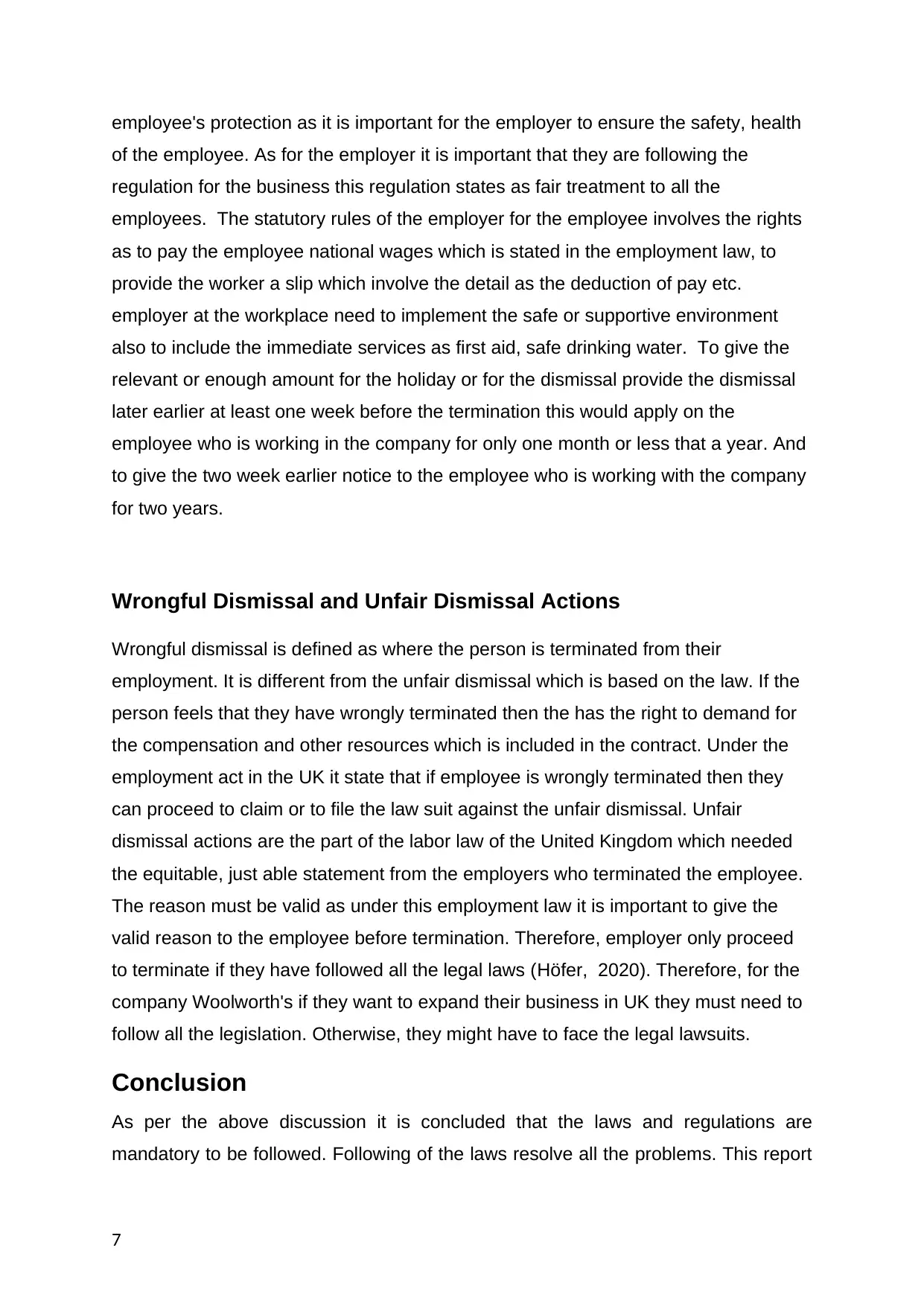
employee's protection as it is important for the employer to ensure the safety, health
of the employee. As for the employer it is important that they are following the
regulation for the business this regulation states as fair treatment to all the
employees. The statutory rules of the employer for the employee involves the rights
as to pay the employee national wages which is stated in the employment law, to
provide the worker a slip which involve the detail as the deduction of pay etc.
employer at the workplace need to implement the safe or supportive environment
also to include the immediate services as first aid, safe drinking water. To give the
relevant or enough amount for the holiday or for the dismissal provide the dismissal
later earlier at least one week before the termination this would apply on the
employee who is working in the company for only one month or less that a year. And
to give the two week earlier notice to the employee who is working with the company
for two years.
Wrongful Dismissal and Unfair Dismissal Actions
Wrongful dismissal is defined as where the person is terminated from their
employment. It is different from the unfair dismissal which is based on the law. If the
person feels that they have wrongly terminated then the has the right to demand for
the compensation and other resources which is included in the contract. Under the
employment act in the UK it state that if employee is wrongly terminated then they
can proceed to claim or to file the law suit against the unfair dismissal. Unfair
dismissal actions are the part of the labor law of the United Kingdom which needed
the equitable, just able statement from the employers who terminated the employee.
The reason must be valid as under this employment law it is important to give the
valid reason to the employee before termination. Therefore, employer only proceed
to terminate if they have followed all the legal laws (Höfer, 2020). Therefore, for the
company Woolworth's if they want to expand their business in UK they must need to
follow all the legislation. Otherwise, they might have to face the legal lawsuits.
Conclusion
As per the above discussion it is concluded that the laws and regulations are
mandatory to be followed. Following of the laws resolve all the problems. This report
7
of the employee. As for the employer it is important that they are following the
regulation for the business this regulation states as fair treatment to all the
employees. The statutory rules of the employer for the employee involves the rights
as to pay the employee national wages which is stated in the employment law, to
provide the worker a slip which involve the detail as the deduction of pay etc.
employer at the workplace need to implement the safe or supportive environment
also to include the immediate services as first aid, safe drinking water. To give the
relevant or enough amount for the holiday or for the dismissal provide the dismissal
later earlier at least one week before the termination this would apply on the
employee who is working in the company for only one month or less that a year. And
to give the two week earlier notice to the employee who is working with the company
for two years.
Wrongful Dismissal and Unfair Dismissal Actions
Wrongful dismissal is defined as where the person is terminated from their
employment. It is different from the unfair dismissal which is based on the law. If the
person feels that they have wrongly terminated then the has the right to demand for
the compensation and other resources which is included in the contract. Under the
employment act in the UK it state that if employee is wrongly terminated then they
can proceed to claim or to file the law suit against the unfair dismissal. Unfair
dismissal actions are the part of the labor law of the United Kingdom which needed
the equitable, just able statement from the employers who terminated the employee.
The reason must be valid as under this employment law it is important to give the
valid reason to the employee before termination. Therefore, employer only proceed
to terminate if they have followed all the legal laws (Höfer, 2020). Therefore, for the
company Woolworth's if they want to expand their business in UK they must need to
follow all the legislation. Otherwise, they might have to face the legal lawsuits.
Conclusion
As per the above discussion it is concluded that the laws and regulations are
mandatory to be followed. Following of the laws resolve all the problems. This report
7
Paraphrase This Document
Need a fresh take? Get an instant paraphrase of this document with our AI Paraphraser
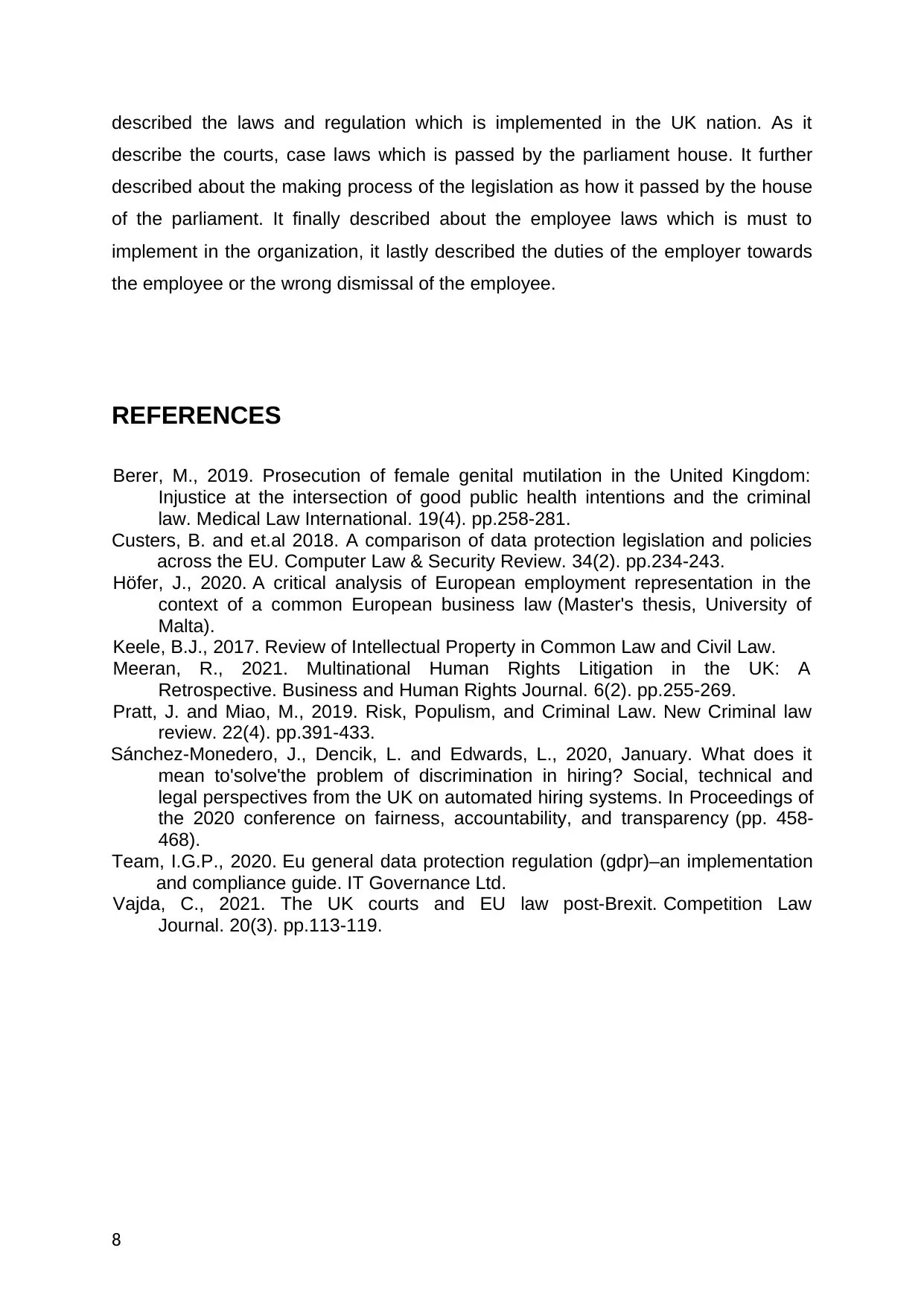
described the laws and regulation which is implemented in the UK nation. As it
describe the courts, case laws which is passed by the parliament house. It further
described about the making process of the legislation as how it passed by the house
of the parliament. It finally described about the employee laws which is must to
implement in the organization, it lastly described the duties of the employer towards
the employee or the wrong dismissal of the employee.
REFERENCES
Berer, M., 2019. Prosecution of female genital mutilation in the United Kingdom:
Injustice at the intersection of good public health intentions and the criminal
law. Medical Law International. 19(4). pp.258-281.
Custers, B. and et.al 2018. A comparison of data protection legislation and policies
across the EU. Computer Law & Security Review. 34(2). pp.234-243.
Höfer, J., 2020. A critical analysis of European employment representation in the
context of a common European business law (Master's thesis, University of
Malta).
Keele, B.J., 2017. Review of Intellectual Property in Common Law and Civil Law.
Meeran, R., 2021. Multinational Human Rights Litigation in the UK: A
Retrospective. Business and Human Rights Journal. 6(2). pp.255-269.
Pratt, J. and Miao, M., 2019. Risk, Populism, and Criminal Law. New Criminal law
review. 22(4). pp.391-433.
Sánchez-Monedero, J., Dencik, L. and Edwards, L., 2020, January. What does it
mean to'solve'the problem of discrimination in hiring? Social, technical and
legal perspectives from the UK on automated hiring systems. In Proceedings of
the 2020 conference on fairness, accountability, and transparency (pp. 458-
468).
Team, I.G.P., 2020. Eu general data protection regulation (gdpr)–an implementation
and compliance guide. IT Governance Ltd.
Vajda, C., 2021. The UK courts and EU law post-Brexit. Competition Law
Journal. 20(3). pp.113-119.
8
describe the courts, case laws which is passed by the parliament house. It further
described about the making process of the legislation as how it passed by the house
of the parliament. It finally described about the employee laws which is must to
implement in the organization, it lastly described the duties of the employer towards
the employee or the wrong dismissal of the employee.
REFERENCES
Berer, M., 2019. Prosecution of female genital mutilation in the United Kingdom:
Injustice at the intersection of good public health intentions and the criminal
law. Medical Law International. 19(4). pp.258-281.
Custers, B. and et.al 2018. A comparison of data protection legislation and policies
across the EU. Computer Law & Security Review. 34(2). pp.234-243.
Höfer, J., 2020. A critical analysis of European employment representation in the
context of a common European business law (Master's thesis, University of
Malta).
Keele, B.J., 2017. Review of Intellectual Property in Common Law and Civil Law.
Meeran, R., 2021. Multinational Human Rights Litigation in the UK: A
Retrospective. Business and Human Rights Journal. 6(2). pp.255-269.
Pratt, J. and Miao, M., 2019. Risk, Populism, and Criminal Law. New Criminal law
review. 22(4). pp.391-433.
Sánchez-Monedero, J., Dencik, L. and Edwards, L., 2020, January. What does it
mean to'solve'the problem of discrimination in hiring? Social, technical and
legal perspectives from the UK on automated hiring systems. In Proceedings of
the 2020 conference on fairness, accountability, and transparency (pp. 458-
468).
Team, I.G.P., 2020. Eu general data protection regulation (gdpr)–an implementation
and compliance guide. IT Governance Ltd.
Vajda, C., 2021. The UK courts and EU law post-Brexit. Competition Law
Journal. 20(3). pp.113-119.
8
1 out of 8
Related Documents
Your All-in-One AI-Powered Toolkit for Academic Success.
+13062052269
info@desklib.com
Available 24*7 on WhatsApp / Email
![[object Object]](/_next/static/media/star-bottom.7253800d.svg)
Unlock your academic potential
© 2024 | Zucol Services PVT LTD | All rights reserved.
